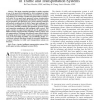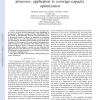157 search results - page 20 / 32 » Formal Methods for Dynamic Power Management |
IFL
2005
Springer
15 years 8 months ago
2005
Springer
The iData Toolkit is a toolkit that allows programmers to create interactive, type-safe, dynamic web applications with state on a high level of abstraction. The key element of this...
125
Voted
TITS
2010
14 years 9 months ago
2010
The agent computing paradigm is rapidly emerging as one of the powerful technologies for the development of largescale distributed systems to deal with the uncertainty in a dynamic...
127
click to vote
VEE
2006
ACM
15 years 8 months ago
2006
ACM
The Pi-calculus is a formalism to model and reason about highly concurrent and dynamic systems. Most of the expressive power of the language comes from the ability to pass communi...
151
click to vote
HICSS
1999
IEEE
15 years 6 months ago
1999
IEEE
In this paper, we motivate the importance of the field of mobile computing and survey current practical and formal approaches. We argue that the existing formalisms are not suffic...
WIOPT
2010
IEEE
15 years 24 days ago
2010
IEEE
—Self-organizing networks (SON) is commonly seen as a way to increase network performance while simplifying its management. This paper investigates Packet Scheduling (PS) in the ...


